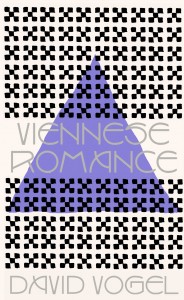Published by Scribe 29 August 2013
288pp, hardback, £14.99
Reviewed by John Petherbridge
What would the writer David Vogel make of Viennese Romance, the English language translation from Hebrew, of the novel published under his name?
Viennese Romance was never published in Vogel’s lifetime. It was reconstructed sixty years later from drafts and fragments allegedly found buried in the grounds of a guest house in South eastern France where Vogel was staying when arrested by the Nazis in1944. (I say allegedly because Lilach Nethanel, who, with Youval Shimoni, reconstructed the novel, doubts the account of the manuscripts’ burial and subsequent recovery.) Vogel was sent to Auschwitz where he was murdered.
In their notes at the end of the text, the editors explain that they edited Vogel’s work, ‘to enable today’s reader to read something that has been hidden for many decades and is long overdue for attention’. In order to do so they admit to condensing repetitive or contradictory statements and in relocating passages where deemed appropriate.
By and large this editing works. Viennese Romance is a very readable account of a young man adrift in pre-First World War Vienna. Eighteen-year-old Michael Rost arrives there en route for ‘one of the lands of the Near East….which a handful of idealistic people with an attachment to the distant past were trying to revive by the hard work of their hands and the enthusiasm beating in their hearts.’
Rost abandons his journey and settles in Vienna. The ambition which drove him from his home in Russian-Poland to reach what was presumably Palestine is forgotten and never mentioned again. InVienna he is without purpose, content to deal with life as it happens. He believes that, ‘there was no need for anyone to strive for anything beyond oneself – life itself, just as it was, was interesting enough.’
Rost soon runs out of money but doesn’t attempt to find work. Instead he is content with the company of equally poor anarchists, artists, musicians, writers, whores and dreamers from all parts of the Austro-Hungarian Empire and beyond, who meet, eat, cadge off each other and, above all, argue at a vast restaurant complex offering cheap food and drink. This is not the cafe society of the Viennese cultural superstars, Freud, Klimt, Schoenberg and Zweig, but that of a world where poverty, aspiration and failure, rather than success, prevail.
A shady businessman gives Rost a large sum of money, no questions asked. It provides Rost with the means to move from the couches and floors of his beer hall acquaintances to a rented room in the apartment of a middle-class couple and their sixteen-year-old daughter. Rost continues to frequent the restaurant using his newly acquired wealth to tease and provoke his old acquaintances. Rost is not particularly likeable. He is arrogant and enjoys asserting his perceived sense of superiority. A typical eighteen-year-old male?
At his new accommodation Rost begins a passionate, sexually-charged, affair with Gertrude, his landlady, under the nose of her husband who is too complacent to notice. However Erna, the landlady’s daughter, does notice and becomes obsessed with Rost. Rost soon tires of Gertrude’s sexual demands and possessiveness. He turns his amorous attention to Erna. The working out of these relationships provides the novel with a slender narrative backbone.
The book begins with a prologue set in Paris many years after Rost’s arrival in Vienna. It ends with an epilogue similarly set in Paris but at a presumably later date. Both scenes are beautifully written but seem irrelevant to the novel as it now exists. It feels as if the editors couldn’t resist the temptation to include this material.
Viennese Romance may or may not be close to the novel David Vogel intended but it has enough fine scenes, interesting characters and sex to make it well worth reading.
.

